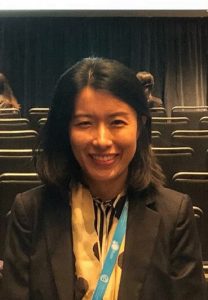 My engagement in digital rhetorics started with an unexpected event. Living in Houston, one of the most vulnerable cities near the Gulf of Mexico in climate change, I came to be interested in environmental activism and digital communications. While experiencing almost annual floods since 2015, many migrant communities in Houston have had less access not only to material resources but also to civic information needed for the recovery process. This information gap and inequality, however, also led newly arrived migrants to negotiating creative ways of digital literacies.
My engagement in digital rhetorics started with an unexpected event. Living in Houston, one of the most vulnerable cities near the Gulf of Mexico in climate change, I came to be interested in environmental activism and digital communications. While experiencing almost annual floods since 2015, many migrant communities in Houston have had less access not only to material resources but also to civic information needed for the recovery process. This information gap and inequality, however, also led newly arrived migrants to negotiating creative ways of digital literacies.
My current research explores how digital technologies, particularly, non-U.S.-based social media networks give migrant communities rhetorical tools through which they can bring their own local and transnational experiences and global-local relations. As an instructor at the University of Houston and Houston Community College, I also have actively enacted with my students several activist projects including doing oral history writings, archive research on bayou and ship channel preservation.
As a DRC Graduate Fellow, I will call on scholars’ and teachers’ attention to migrant communities, geographical specificities, and youth environmental activism in climate change and its ensuing human-induced risks. Particularly, social networking sites that migrant communities use for everyday communication with left-behind families in their home countries and co-nationals in their host countries have the potentials to be more highlighted in digital rhetoric conversations. While these language minorities are often disenfranchised as they are categorized as temporary sojourners or non-citizen alien residents by governmental agencies, they have enacted a wide range of grassroots digital communications and translingual practices to recover their precarious material lives and dismantle the notion of citizenship on digital platforms.
Interestingly, in the DRC, social media often refer to Facebook, Twitter, and Instagram. The discourses on social networking platforms have not fully included other non-U.S.-based social network tools, including Line, Kakao Talk, WeChat, etc., which have been fast-growing mobile applications in the global instant messaging market. These mobile applications reflect the affective dimensions of digital literacies, cultural-specific factors, socioeconomic constraints, and material environmental changes including climate varieties and human-induced risks in material ecologies.
I am very thrilled to start a new engagement at the DRC. Based on the preexisting conversations at the DRC and other wonderful fellows this year, I am involved in creating webtexts and organizing workshops. I look forward to extending the scope of digital rhetorics into community-based praxis! More stories about me can be found at sites.google.com/view/soyeonlee. To share ideas or talk about collaborative projects for DRC, please do contact me at slee87@uh.edu or via Twitter at @soyeonlee2127!

1 Comment
Congrats, Soyeon!